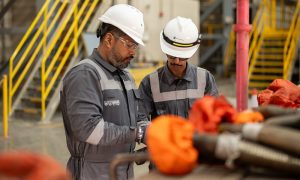Smart construction will usher in era of Middle East smart cities
The Middle East is all abuzz with excitement about smart cities – and rightfully so! Economic, social and technological factors have converged to make the region prime and ready for wide-spread Smart City developments. Design and planning of these cities of tomorrow are already underway, with governments in the UAE, Saudi Arabia and Qatar already solidly backing such initiatives.
As the region ushers in this new era of advancement, much has been predicted and promised about the integration of ICT in every aspect of the completed city developments. There is, however, no reason the benefits of technology cannot be leveraged much sooner than that – at the construction phase itself, where mobility can streamline operations.
The computing capabilities of mobile devices have advanced to a level that has made them capable of aiding the planning, designing and building phases. But turning mobility into an effective tool requires not only computing power but also connectivity. And at job-sites, wired connections are not feasible and cellular networks are not always available. A strong case can therefore be made for developers to use Wi-Fi solutions. These are not only easy to install and manage, but are now also affordable and rugged enough to see deployment in harsh construction environments.
Facilitating workflow
It isn’t uncommon for construction workers to still rely on paper documentation. Besides being cumbersome to transport and maintain, these documents need to be regularly updated, often at the site itself. With the introduction of tablet devices, mobile project management has emerged as a worthy replacement for age-old methods. Coupled with the broad ecosystem of feature-rich mobile applications and the ability to draw from vast amounts of remotely stored data and cloud services, these devices are capable of granting contractors, engineers and supervisors access to blueprints, schematics and other vital documents. Moreover, with the ability to instantly push updates to all members working on the project, mobile computing devices can aid collaboration and revolutionise the building information modelling (BIM) process in real time.
With site-wide high-speed wireless connectivity for all mobile devices, workers gain the ability to transfer high volumes of data back and forth between each other and HQ. This significantly streamlines communications, while cutting costs and improving operational efficiency. It also has attractive green side-effects, as staff no longer have to make regular trips to and from HQ.
Enabling asset tracking and better inventory
At job-sites, company assets are a major investment and the progress of construction is heavily reliant on their functionality. Heavy equipment such as cranes, bobcats and cement mixers are often required to be left on-site overnight. This makes them a prime target for theft. Asset tracking technologies help monitor equipment in remote locations and automatically detect and report suspicious behaviour. These systems can also determine utilisation of expensive equipment to help supervisors determine if it is being over- or underutilised.
Developers also benefit from automated maintenance schedules, logs and reports. Cheap and easy RFID technology makes automation of inventory management possible. By knowing in advance which materials will soon run out, construction companies can anticipate and avoid material shortages, eliminating losses in productivity.
All these systems can only be deployed on a robust Wi-Fi platform. Connectivity is becoming essential to procurement, logistics and workforce planning.
Site security
Another vital area of a construction site where mobile technology can be applied is video surveillance. Not only does this enable better collaboration and remote supervision, it is essential to site security. High-speed connectivity for robust and cost-effective camera equipment means ready availability of high definition video, making both identification and collaboration easier. These video systems are also a key part of asset tracking systems.
Assessing Wi-Fi solutions for the construction site
The challenge for the developer is to find a robust enterprise-class WLAN that is affordable in terms of capital expense and operational overhead. While construction companies may be staffed with savvy IT professionals at headquarters, they have limited resources and RF expertise at remote locations. Consequently, they must use mobility solutions that are simple to set up, highly reliable and can be managed centrally. While portable enough to be transposed from one site to another, these systems must also offer enterprise-grade WLAN functionality.
As construction integrates more deeply with IT, network uptime will become an increasingly important factor. It is therefore prudent to invest in network management tools to provide maximum network availability. Software that periodically backs up all device configurations on the network is simple but extremely useful.
Finally, developers must also invest in training personnel in new technologies. To ensure a smooth transition from traditional methods to the modern mobile construction site, it is best to ensure that all team members are well-versed in and comfortable with all aspects of mobile technology. Once this has been achieved, smart construction will usher in the era of the smart city.
Ammar Enaya is general manager of Aruba Networks Middle East, an HP Company.

























